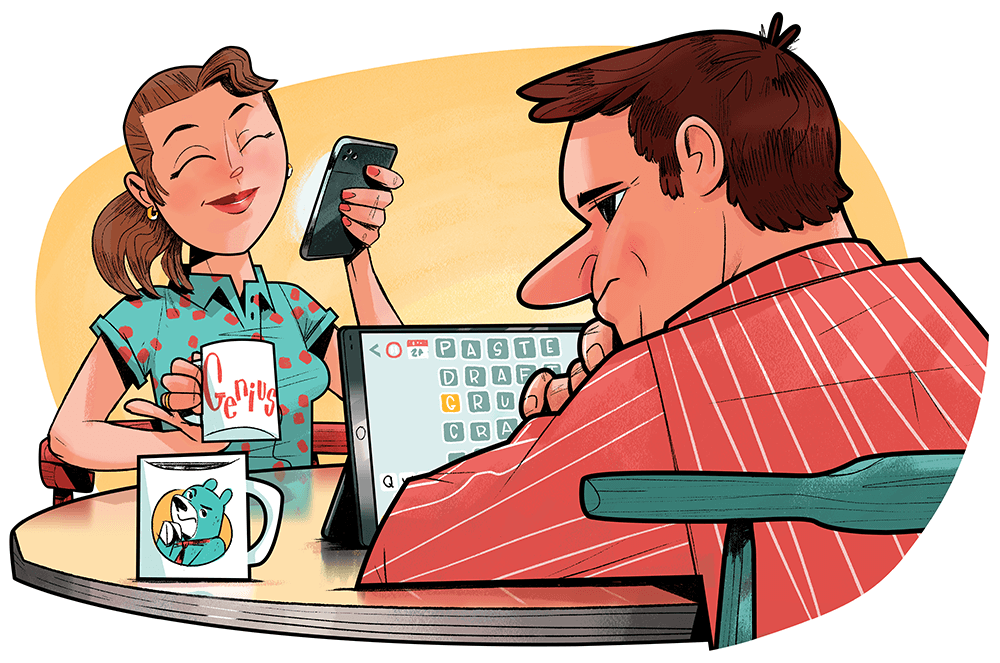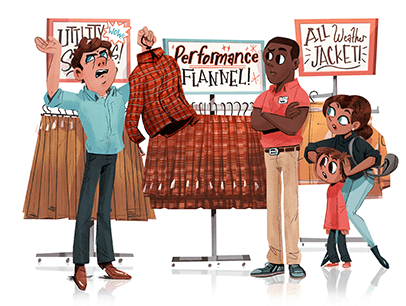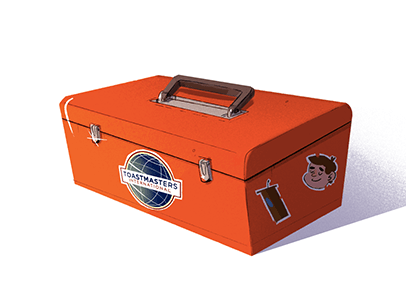
People love word games. They help pass the time in airports, provide just enough of a mental challenge to keep the old synapses firing, and elicit a pleasant feeling of satisfaction when completed successfully. No matter how badly the day has gone, if you can finish The New York Times crossword by filling in “obumbrate” for “to darken or overshadow,” a rainbow appears, and you know the sun will come up tomorrow.
The first word game I ever played was Hangman. Your opponent draws both a gallows and short lines underneath the image for the letters of the word he or she is thinking of. You guess a letter. If it’s in the word, it goes on the appropriate line. If it’s not, your opponent starts drawing a stick figure, piece by piece, hanging from the gallows. You must get enough correct letters to guess the word before the stick figure is complete. In other words, you win or you die. But then this is true of all word games. Failure to complete word puzzles invariably results in a mini death of the ego, causing one to question what moral failure of character has made you ignorant of a six-letter word for a leguminous African tree.
The most popular word game appears to be Scrabble, which has been going strong since 1938 and is now played in 30 languages across 121 countries. Do you hear that low din in the background? It’s the sound of roughly 1,432,678 heated arguments taking place simultaneously around the globe, in everything from Mandarin Chinese to Creole French, as to whether “snollygoster” is a legitimate word.
If you’ve never played Scrabble I would advise you to refrain. As noted, Scrabblers take their game seriously. Angry confrontations can result in players pelting each other with the game’s small wooden tiles. If you see someone with little square indentations on their forehead, it’s probably a player who insisted that “irregardless” is a real word. My hope is to spare you from having a face that looks like a checkerboard.
Angry confrontations can result in players pelting each other with the game’s small wooden tiles.
Also, the game is addictive. Scoring 72 points with “maieutics” floods your brain with dopamine, causing a rush you will long to repeat. Just ask the American actor Alec Baldwin, who was removed from an American Airlines flight for refusing to put his cell phone away because he was playing an online Scrabble-like game called Words With Friends. Apparently, Mr. Baldwin would rather be stranded in an airport eating stale fruit bars from the amenities cart than lose to a complete stranger halfway around the world.
Another long-running word game is the American television show Wheel of Fortune. Much like with Hangman, the object is to fill in enough letters to guess the word, and here too, failure can result in death—a death by public humiliation. In one episode the mystery word was “self-portrait” and the contestant had enough letters to guess it easily, and yet for some reason she blurted out “self-potato”! I don’t know what happened to the unfortunate soul, but rumor has it she joined the Survivor TV show and ended up in Cuba’s Canarreos Archipelago, where she was voted off the island but refused to leave and disappeared into the jungle. Much like Mr. Baldwin in the airport, it seems the poor woman would rather live with spiders, snakes, and poisonous frogs than return home and die a thousand deaths being called The Self-Potato Woman.
All of which brings us to the new fave rave in word games—Wordle. Invented by a Brooklyn-based software programmer to give his partner a distraction during the pandemic, Wordle took off like Jeff Bezos’ rocket ship and is now played by millions, perhaps because of its simplicity: six tries to guess a five-letter word, with each guess adding correct letters and eliminating wrong ones. You should get it in six tries. The average seems to be three or four. Apparently, I’m not average. Working today’s Wordle, I’m on my fifth try with only one correct letter and only one more chance—the Wordle player’s equivalent of running from a pack of wolves and ending up at the edge of a cliff. What’s worse, I know my wife got it on her third try. My vanity won’t let me ask her for a clue, and my ego won’t let me lose. I’m in a double bind that’s killing me. But then that’s the thing with word games, isn’t it? You win or you die.
John Cadley is a former advertising copywriter, freelance writer, and musician living in Fayetteville, New York. Learn more at www.cadleys.com.



 Previous
Previous

 Previous Article
Previous Article

